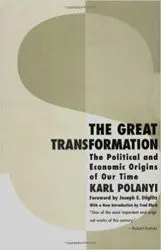
Karl Polanyi, The Great Transformation
Polanyi, Karl. The Great Transformation: The Political and Economic Origins of Our Time. 1944.
Review by Genevieve Carlton
In the debate between free markets and a state-controlled economy, Karl Polanyi posits a more complicated answer than the libertarians or socialists. Polanyi, a Hungarian-American political economist, argued in his 1944 The Great Transformation that the emerging nation state and the market economy were not separate creations. Rather, they are a single human invention, which Polanyi terms the “market society.”
At its core, Polanyi’s political economy argues that all markets are planned, not the result of organic evolution. The economy itself is embedded in society, constantly influenced by social relations. Because of this, a “free market society” cannot exist, because it rests on the fiction that the economy can be divorced from the state and society. His argument roots itself in a historical analysis of four centuries of history, as the entwined rise of the nation state and the market economy created a hybrid “market society.”
Polanyi turns to eighteenth century poor relief to ground his historical analysis. He starts with the English Speenhamland system, dominant into the nineteenth century, which provided supplemental wages for the rural poor on a sliding scale. England later replaced the system with the New Poor Law of 1834, which eliminated the basic income provisions of the prior law. The change, seen as a step away from government regulation, was driven by a government act that outsourced the problem to the labor market.
This move toward markets, Polanyi contends, destabilizes society. “To allow the market mechanism to be the sole director of the fate of human beings and their natural environment . . . would result in the demolition of society.” (76) This is because “labor power” is not a true commodity, but rather inexorably linked to the human being who provides it. And humans will always resist the effort to turn themselves into commodities.
The great transformation of Polanyi’s title refers to the human consequence of the new market society. Economic mentalities themselves had to shift before capitalism could emerge, in order for people to conceive of the market as a separate force. Here, too, Polanyi sees the role of the state, which laid the groundwork for the changes in human nature that led to the emergency of a capitalist economy. Central to the transformation was the idea that labor itself could be sold on the market.
Polanyi’s position challenged the notion of nineteenth century laissez-faire economics, the core of liberal capitalism, by claiming “laissez-faire was planned.” The concept of a “hands-off” market system itself had roots in the transformative concept that trade networks and impersonal transactions created prosperity, an idea embraced by states around the world.
The fiction that markets exist outside of a social context creates social dislocation, according to Polanyi. And here, too, his conclusions found historical precedent. Although published in 1944, Polanyi wrote The Great Transformation during the interwar years. After fleeing communist Hungary, spending the 1920s in socialist Vienna, and then teaching in 1930s England, Polayni had first-hand experience with the intense early 20th century debates over state, economy, and society.
The Great Transformation, published in the waning years of World War II, warned post-war leaders of the repercussions of economic systems. These systems, which could lead to fascism and anti-democratic backlashes, were not outside the control of society. Polanyi argued that economic and social problems cannot be untwined, which gives society power over economic conditions.
Return to the reviews or the annotated bibliography
Genevieve Carlton is an award-winning historian with a Ph.D in History from Northwestern University. In 2017, she earned tenure at the University of Louisville. Her work has been published by the University of Chicago Press and in top academic journals.